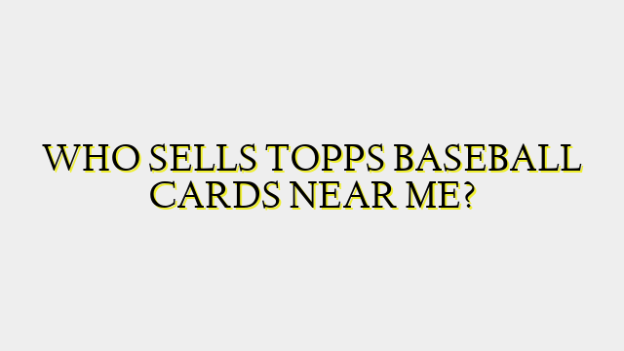There are several different types of retailers in most areas that sell baseball cards. The first places to check would be your local hobby shops, comic book stores, and game stores that focus on trading card games like Magic: The Gathering or Pokémon. Even if baseball cards aren’t their primary product, many of these specialty shops will carry supplies and individual packs, boxes, and collections of baseball cards for people interested in collecting, trading, or building decks. They tend to have a good variety of both modern and vintage cards from the major brands like Topps, Upper Deck, and Bowman. You can usually find them listed in online searches or by asking around your local card-collecting community.
In addition to hobby shops, many major bookstore chains like Barnes & Noble or Books-A-Million will have a trading card section with at least a basic baseball card selection. It’s mostly focused on the current year’s release, but they may have some boxes or bundle packs of older years available as well depending on what the distributor provides. The card condition usually won’t be as high-grade as hobby shops but it’s a convenient one-stop option if you need some packs to rip or commons to build sets. Various office supply stores like Staples may carry loose packs and blasters in season too.
Another option is visiting your local sporting goods stores, especially those with a baseball equipment section. Stores like Dick’s Sporting Goods and Modell’s will often put out new baseball card product in season, keeping singles, boxes, and special packs in the sports card aisles. The larger stores may even break street dates on popular release days. Sign up for their emails if you want alerts on upcoming specials and releases. Some specialized baseball card shops like Card Bearer MLB or Topps Fan Headquarters have popped up in malls recently too for one-stop shopping.
When it comes to vintage baseball cards from the 1950s-1980s, your best bets are antique malls, card shows, online auction sites, and specialty vintage card shops. Antique malls are treasure troves with dozens of dealer booths under one roof selling all sorts of collectibles, so be sure to thoroughly check each case for vintage cardboard gold. Regional card shows draw in dealers from all over with thousands of cards for sale – a great place to browse, compare prices, and meet other collectors face to face. Online marketplaces like eBay allow searching 24/7 from home but require diligence to avoid scams and forgeries. A few vintage card shops exist both online and with brick-and-mortar locations in major cities too.
You should also be on the lookout for card shops temporarily set up in larger public venues. General sports card shows, comic/trading card conventions, and toy/memorabilia expos are regularly held in convention centers featuring dozens of vendors. Many card companies rent space at major baseball stadiums on opening weekend or All-Star game dates to sell exclusive product released just for those events. Farmers markets, flea markets, and garage/basement sales might turn up the occasional forgotten shoebox collection too. Always check local free papers or community message boards for notices of estate auctions which can yield treasure troves of vintage finds if you do your research.
Don’t forget to utilize the vast network of online baseball card retailers at your fingertips. Websites like Blowout Cards, DaCardWorld, Steel City Collectibles and numerous eBay and Amazon sellers provide an instantly searchable huge virtual marketplace of new and vintage singles, boxes, and supplies on any budget. If you sign up for newsletters from major card companies like Topps, Panini, Leaf etc. you’ll be notified about website exclusives, sales, and new releases so nothing slips through the cracks. With enough digging online and checking local sources, you should be able to track down someone selling baseball cards nearby no matter where you live. Just be sure to handle cards carefully and know market values before making any investments. Happy collecting!

